A number of fans of the top four leagues used to complain when their team finished fourth Those fans should put themselves in Olympiacos boots — they began play on July 23, when most players were still posting Instagram selfies of themselves on yachts, and from that dismal first outing, a goalless draw with Viktoria Plzeň, it looked as though they wouldn’t be sticking around long. But in Athens, Olympiacos came roaring back, scoring four against the hapless visitors. The Thrylos lived up to their name, The Legend, scoring 13 altogether during qualifying while allowing just one. Even more impressively, they held Spurs to a draw, scored two against Bayern, and beat Red Star, all at home. Sure, their goal difference was -6 at the end of the group stages, but their four points were enough to keep them in Europe. I say all this to make two points: Olympiacos are not going to play as though the Europa League is beneath them, nor are they going to be gentle when teams come to Athens. All this time spent, all this goalscoring against some pretty decent teams, well . . . these Olympians are after a medal. In the league, they’re used to standing atop that podium, having won 44 league titles and currently sitting two points above PAOK at the top of the table, with an astonishing +41 goal difference. The side’s dominance is similarly reflected in expected goals. They dominate the league in non-penalty xG difference, averaging 1.23 per match, far and away the best total in Greece. 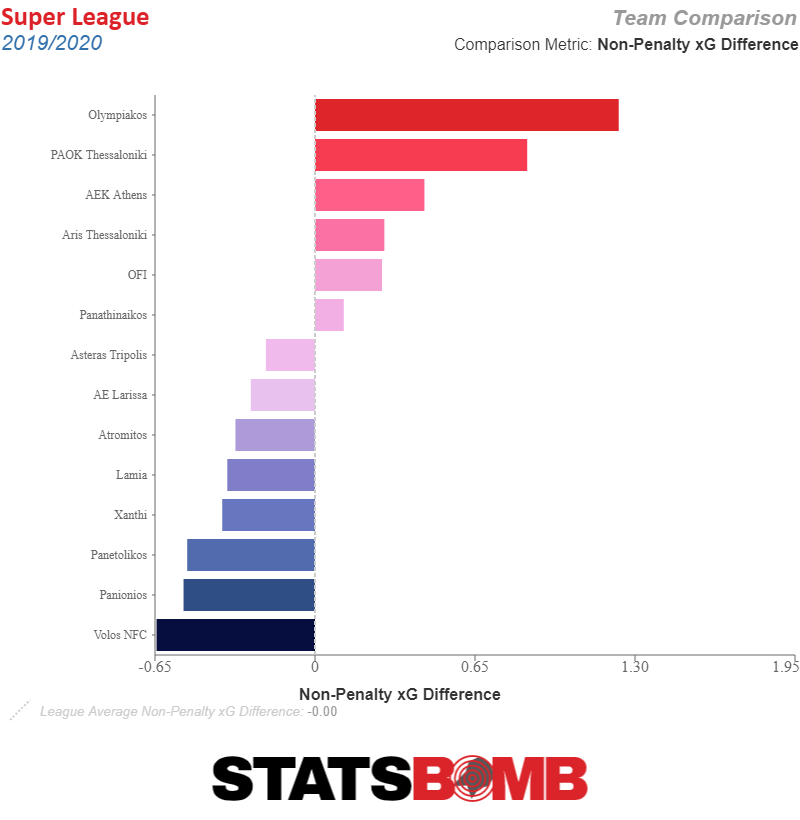 Pedro Martins likes to play an aggressive style of football, pressing forward in numbers, trying to force the opponent to make a mistake and looking for opportunities to create a chance. A heat map of their defensive activity shows just how aggressively they’re parked in the opponents final third, pressing and winning the ball back.
Pedro Martins likes to play an aggressive style of football, pressing forward in numbers, trying to force the opponent to make a mistake and looking for opportunities to create a chance. A heat map of their defensive activity shows just how aggressively they’re parked in the opponents final third, pressing and winning the ball back. 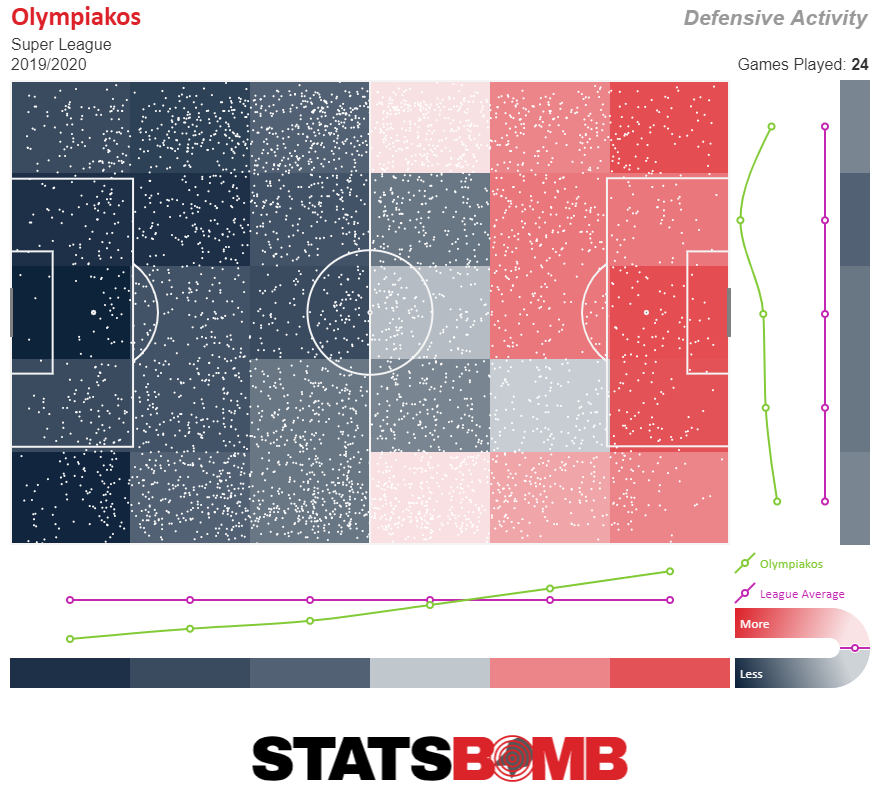 This works well at the league level, where Olympiacos’ quality tends to be head and shoulders above the rest of the crowd. However, during the January transfer window they lost Portuguese winger Daniel Podence, arguably their most talented player, to Wolves.
This works well at the league level, where Olympiacos’ quality tends to be head and shoulders above the rest of the crowd. However, during the January transfer window they lost Portuguese winger Daniel Podence, arguably their most talented player, to Wolves. 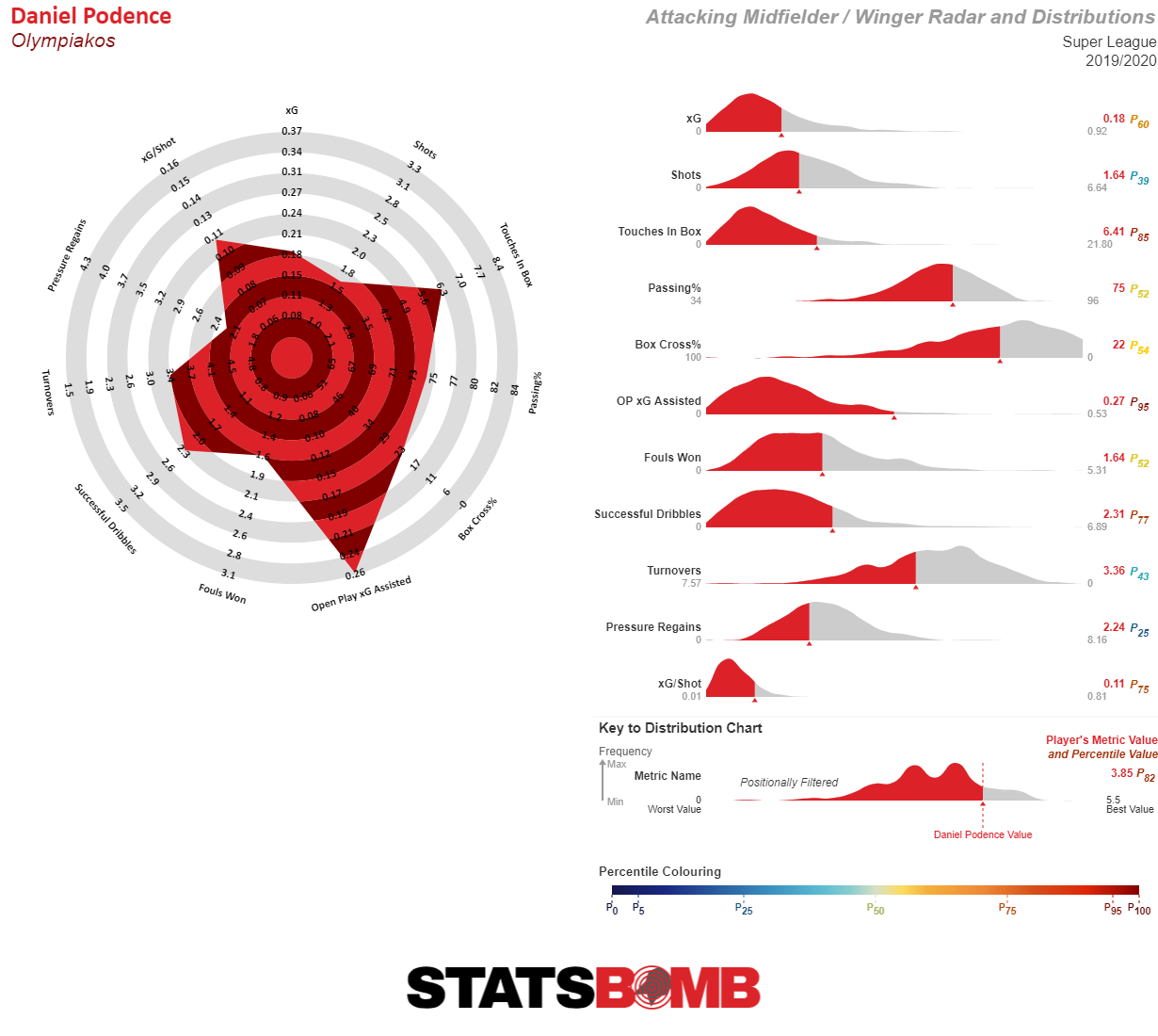 He was a significant creator for this team, and the clear leader in open play xG assisted per 90 in the side. It’s fair to wonder how the team will make up for his creativity. That’s especially true away from home, where the team has largely been a much less robust attacking side.
He was a significant creator for this team, and the clear leader in open play xG assisted per 90 in the side. It’s fair to wonder how the team will make up for his creativity. That’s especially true away from home, where the team has largely been a much less robust attacking side. 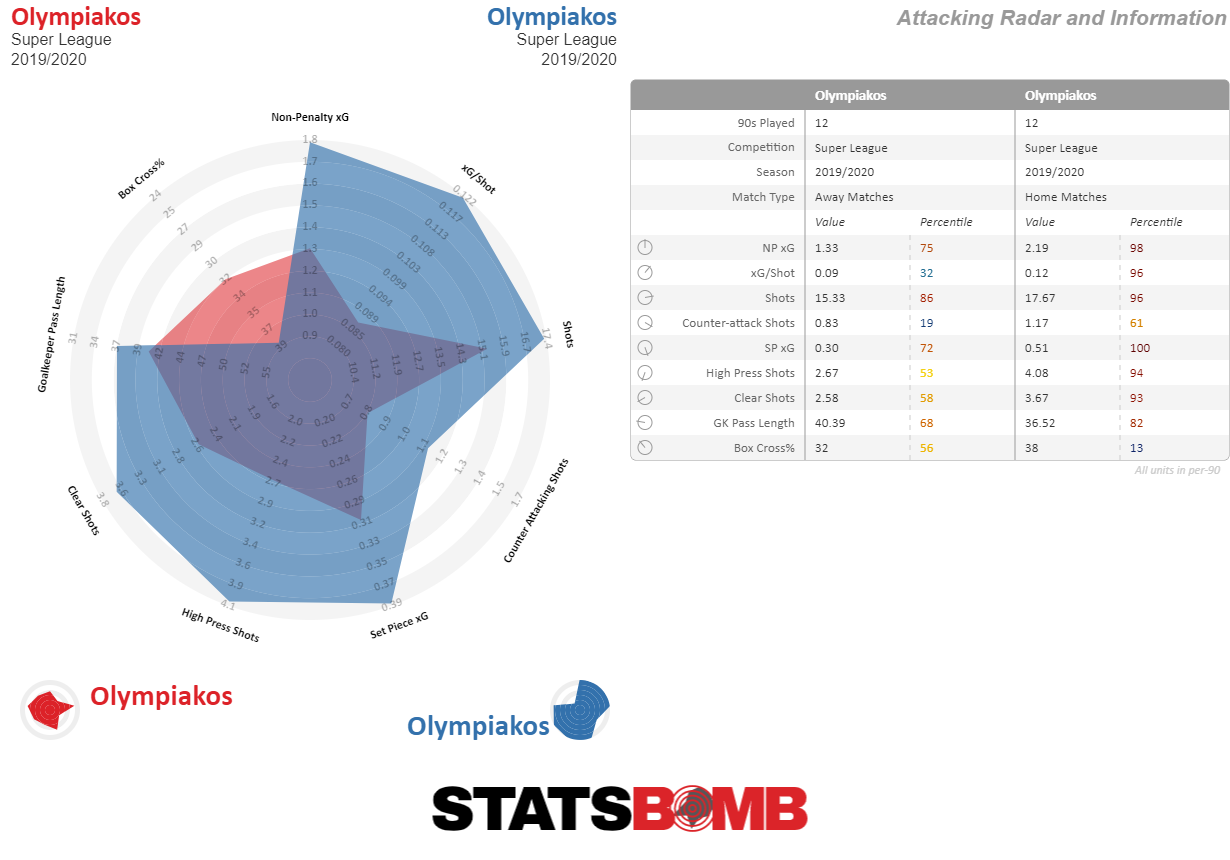 But the thing is, Olympiacos won’t be playing away against Arsenal. And they aren’t the most welcoming of hosts. Now, Arsenal have been through the Europa League rodeo enough recently that they’re aware of just how difficult it is to face Eastern European clubs on their own turf. In fact, Arsenal have visited Karaiskakis Stadium four times in the mighty Champions League, and lost three of those times. Of course, this is a revived Arsenal, fresh off a 4–0 victory to the mighty Newcastle, sitting pretty in 10th in the Premier League. Yes, that’s written in sarcasm font, but the thing is, Arsenal are still better than Olympiacos. Like, a lot better. So while home-field advantage may be enough to throw the visitors off at the start, it won’t be sufficient to beat the Gunners on its own. Fortunately, Olympiacos have another trick up their sleeve; while they may play more defensively in European competition, are still exceedingly dangerous on the counter. The biggest threat is in the form of Youssef El Arabi, who has scored 22 goals this season between the Superleague and Champions League (including qualifying). He has scored or assisted in 9 of his last 12 games, including netting one hat trick and two braces. He may be 33, and he may be getting less service with Podence gone, but he should not be underestimated — it’s not exactly easy to keep a man scoring almost a goal a game on average at bay. The man simply knows how to find great shots.
But the thing is, Olympiacos won’t be playing away against Arsenal. And they aren’t the most welcoming of hosts. Now, Arsenal have been through the Europa League rodeo enough recently that they’re aware of just how difficult it is to face Eastern European clubs on their own turf. In fact, Arsenal have visited Karaiskakis Stadium four times in the mighty Champions League, and lost three of those times. Of course, this is a revived Arsenal, fresh off a 4–0 victory to the mighty Newcastle, sitting pretty in 10th in the Premier League. Yes, that’s written in sarcasm font, but the thing is, Arsenal are still better than Olympiacos. Like, a lot better. So while home-field advantage may be enough to throw the visitors off at the start, it won’t be sufficient to beat the Gunners on its own. Fortunately, Olympiacos have another trick up their sleeve; while they may play more defensively in European competition, are still exceedingly dangerous on the counter. The biggest threat is in the form of Youssef El Arabi, who has scored 22 goals this season between the Superleague and Champions League (including qualifying). He has scored or assisted in 9 of his last 12 games, including netting one hat trick and two braces. He may be 33, and he may be getting less service with Podence gone, but he should not be underestimated — it’s not exactly easy to keep a man scoring almost a goal a game on average at bay. The man simply knows how to find great shots. 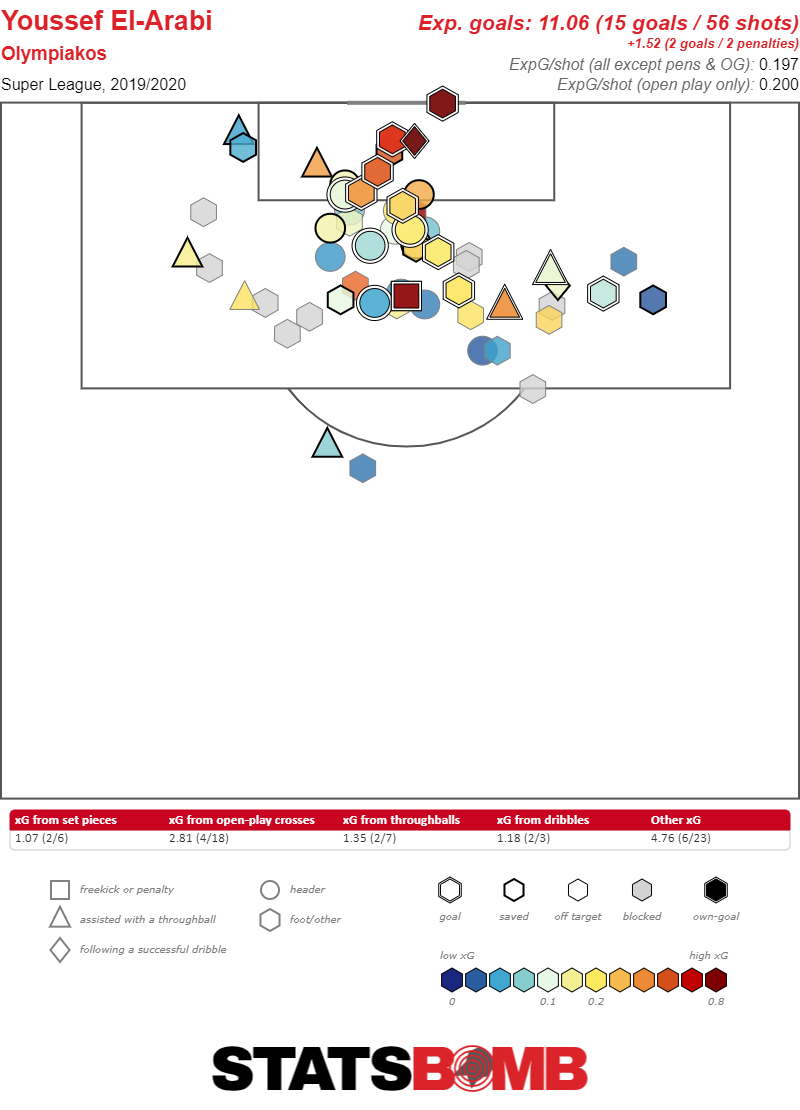 Plus, he’s got the 35-year-old Mathieu Valbuena by his side; when the veteran is not injured he’s helping fill the hole Podence left, having provided 12 assists thus far.Domestically, Valbuena leads the club with 0.40 xG assisted per 90, thanks in no small part to his mastery on set pieces. Olympiacos’s designated deadball wizard is responsible for almost all of the team’s set piece creativity with 0.19 xG assisted per 90 accumulated from those situations alone. Another way Olympiacos could pull off a magical moment is by giving the fullbacks freedom to run Both Kostas Tsimikas on the left and Omar Elabdellaoui on the right love to get forward, which could cost Arsenal if their wingers aren’t able to track back. Over the course of the season the two fullbacks have combined with Podence and Valbuena to do almost all of the team’s crossing, with Tsimikas in particular being a frequent avenue for pumping balls into the box.
Plus, he’s got the 35-year-old Mathieu Valbuena by his side; when the veteran is not injured he’s helping fill the hole Podence left, having provided 12 assists thus far.Domestically, Valbuena leads the club with 0.40 xG assisted per 90, thanks in no small part to his mastery on set pieces. Olympiacos’s designated deadball wizard is responsible for almost all of the team’s set piece creativity with 0.19 xG assisted per 90 accumulated from those situations alone. Another way Olympiacos could pull off a magical moment is by giving the fullbacks freedom to run Both Kostas Tsimikas on the left and Omar Elabdellaoui on the right love to get forward, which could cost Arsenal if their wingers aren’t able to track back. Over the course of the season the two fullbacks have combined with Podence and Valbuena to do almost all of the team’s crossing, with Tsimikas in particular being a frequent avenue for pumping balls into the box. 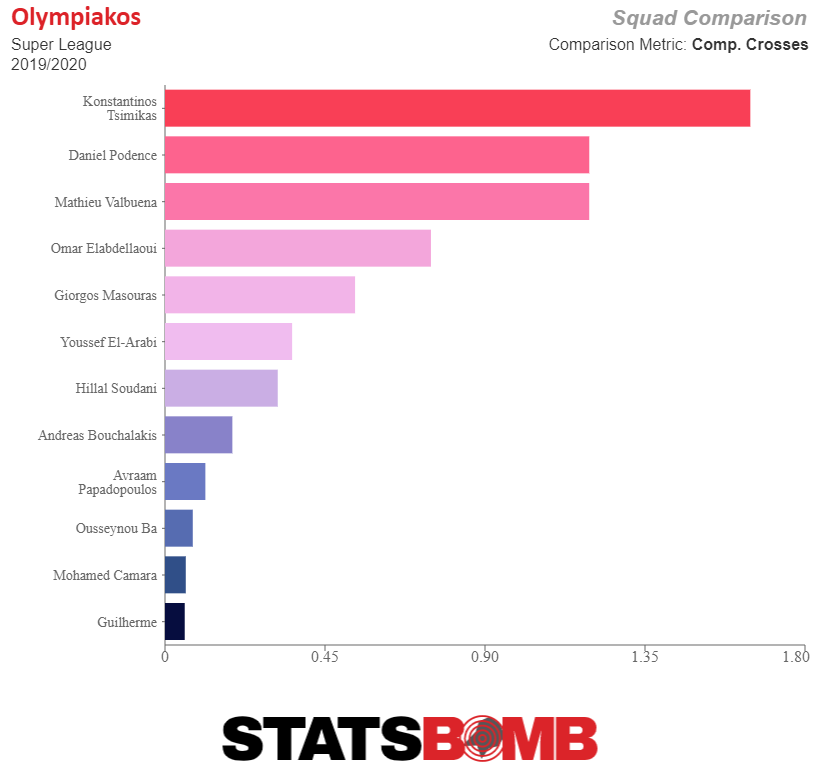 Both Bayern and Tottenham are familiar with just how well Olympiacos can play on the counter. While in general, Mikel Arteta has managed to improve his side’s ability to defend against such attacks, but it’s still a weakness the home side can exploit. Of course, Olympiacos have their own weaknesses. They have trouble controlling the center of the pitch, especially in European games. Players like Andreas Bouchalakis, Mady Camara, and Guilherme can dominate in league games, but are rather ineffective when facing stronger competition. While the side plays defensively on the front foot against weaker competition, they get forced well back by better sides. Their defensive heatmap in the Champions League shows a side whose midfield was either not asked to, or not able to, stop the opposition before it reached their own defensive third.
Both Bayern and Tottenham are familiar with just how well Olympiacos can play on the counter. While in general, Mikel Arteta has managed to improve his side’s ability to defend against such attacks, but it’s still a weakness the home side can exploit. Of course, Olympiacos have their own weaknesses. They have trouble controlling the center of the pitch, especially in European games. Players like Andreas Bouchalakis, Mady Camara, and Guilherme can dominate in league games, but are rather ineffective when facing stronger competition. While the side plays defensively on the front foot against weaker competition, they get forced well back by better sides. Their defensive heatmap in the Champions League shows a side whose midfield was either not asked to, or not able to, stop the opposition before it reached their own defensive third. 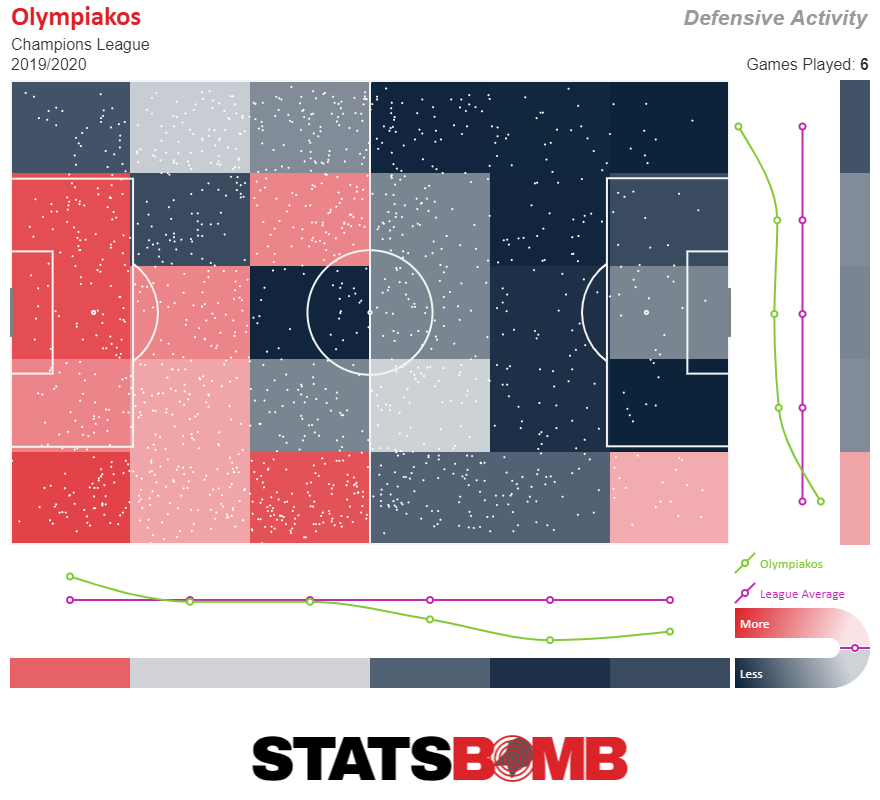 Yet this is not the same Arsenal of years past. So, the question remains, just how good are Arsenal? Can they dominate the ball, exploit Olympiacos’s weaknesses and force them back? Because, if they can’t, the Greek side will hit them fast and hard, the crowd will be ready and willing to make a bit of noise in response, and the Gunners may find themselves with few effective weapons to counter the storm
Yet this is not the same Arsenal of years past. So, the question remains, just how good are Arsenal? Can they dominate the ball, exploit Olympiacos’s weaknesses and force them back? Because, if they can’t, the Greek side will hit them fast and hard, the crowd will be ready and willing to make a bit of noise in response, and the Gunners may find themselves with few effective weapons to counter the storm
2020
Can Olympiacos turn Arsenal's Europa League chances into a Greek tragedy?
By admin
|
February 20, 2020